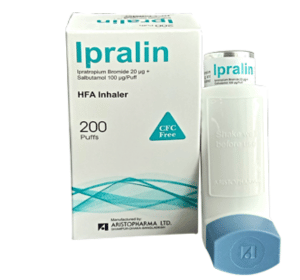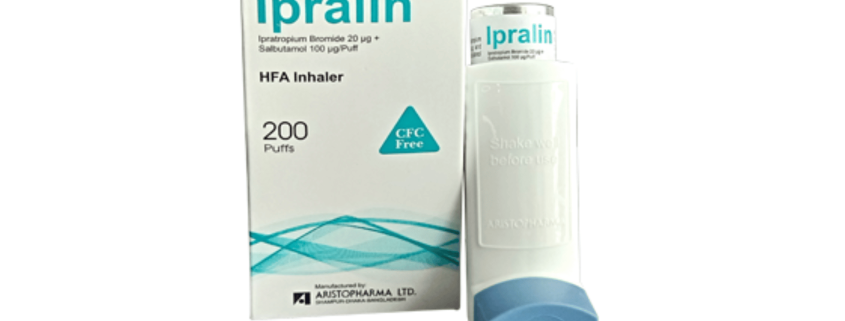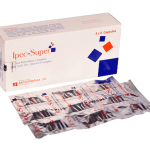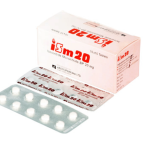Ipralin (Ipratropium Bromide+Salbutamol)

Therapeutic Group : Inhaler
Presentation:
Ipralin HFA Inhaler: Each puff delivers Ipratropium Bromide BP 20 µg and Salbutamol (as Salbutamol Sulphate BP) 100 µg.
Indications:
Ipralin HFA Inhaler is indicated for use in patients with chronic obstructive pulmonary disease (COPD) on a regular aerosol bronchodilator who continue to have evidence of bronchospasm and who require a second bronchodilator.
Dosage & Administration:
The dose of Ipralin HFA Inhaler is 2 puffs 4 times a day. Patients may take additional puffs as required; however, the total number of puffs should not exceed 12 in 24 hours.
Contrainidications:
Ipralin HFA Inhaler is contraindicated in patients with a history of hypersensitivity to soya lecithin or related food products such as soybean and peanut. Ipralin HFA Inhaler is also contraindicated in patients hypersensitive to any component of the drug product or to atropine or its derivatives.
Warning & Precautions:
Ipratropium bromide containing inhaler should be used with caution in patients with narrow-angle glaucoma, prostatic hyperplasia or bladder-neck obstruction.
Salbutamol sulphate containing inhaler should be used with caution in patients with convulsive disorders, hyperthyroidism, or diabetes mellitus and in patients who are unusually responsive to sympathomimetic amines.
Beta-adrenergic agents may also produce significant hypokalemia in some patients (possibly through intracellular shunting) which has the potential to produce adverse cardiovascular effects. The decrease in serum potassium is usually transient, not requiring supplementation. Combination of Ipratropium and Salbutamol Inhaler has not been studied in patients with hepatic or renal insufficiency. It should be used with caution in those patient populations.
Side effects:
Headache, pain, influenza, bronchitis, dyspnea, coughing, respiratory disorders, pneumonia, upper respiratory tract infection, pharyngitis, sinusitis, rhinitis have been reported. Additional adverse reactions reported include edema, fatigue, hypertension, dizziness, nervousness, paresthesia, tremor, dysphonia, insomnia, diarrhea, dry mouth, dyspepsia, vomiting, arrhythmia, palpitation, tachycardia, arthralgia, angina, increased sputum, taste perversion, and urinary tract infection/dysuria.
Drug interaction:
Ipratropium bromide and salbutamol sulfate inhaler has been used concomitantly with other drugs, including sympathomimetic bronchodilators, methylxanthines, and oral and inhaled steroids, commonly used in the treatment of chronic obstructive pulmonary disease. With the exception of salbutamol, there are no formal studies fully evaluating the interaction effects of ipratropium bromide and salbutamol sulfate inhaler and these drugs with respect to effectiveness.
Anticholinergic agents: Although ipratropium bromide is minimally absorbed into the systemic circulation, there is some potential for an additive interaction with concomitantly used anticholinergic medications. Caution is therefore advised in the co-administration of ipratropium bromide and salbutamol sulfate inhaler with other anticholinergic-containing drugs.
Beta-adrenergic agents: Caution is advised in the co-administration of ipratropium bromide and salbutamol sulfate inhaler and other sympathomimetic agents due to the increased risk of adverse cardiovascular effects. Beta-receptor blocking agents and salbutamol inhibit the effect of each other. Beta-receptor blocking agents should be used with caution in patients with hyperreactive airways.
Diuretics: The ECG changes and/or hypokalemia which may result from the administration of non-potassium sparing diuretics (such as loop or thiazide diuretics) can be acutely worsened by beta-agonists, especially when the recommended dose of the beta-agonist is exceeded. Although the clinical significance of these effects is not known, caution is advised in the co-administration of beta-agonist-containing drugs, such as ipratropium bromide and salbutamol sulfate inhaler, with non-potassium sparing diuretics.
Monoamine oxidase inhibitors or tricyclic antidepressants:
Ipratropium bromide and salbutamol sulfate inhaler should be administered with extreme caution to patients being treated with monoamine oxidase inhibitors or tricyclic antidepressants or within two weeks of discontinuation of such agents because the action of salbutamol on the cardiovascular system may be potentiated.
Use in special groups:
Use in pregnancy:
Pregnancy Category C. There are no adequate and well-controlled studies of ipratropium bromide and salbutamol sulfate inhaler, ipratropium bromide or salbutamol sulfate, in pregnant women. Ipralin HFA Inhaler should be used during pregnancy only if the potential benefit justifies the potential risk to the fetus.
Use in lactation:
It is not known whether the components of Ipralin HFA Inhaler are excreted in human milk. Ipralin HFA Inhaler should not be used by breastfeeding mothers, unless the expected benefit is thought to outweigh the risks.
Use in children:
Safety and effectiveness in the pediatric population have not been established.
Packing:
Ipralin HFA Inhaler: Each canister contains 200 puffs.



